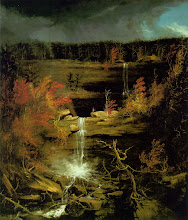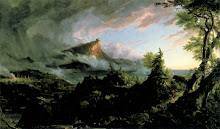Summary:
During the Enlightenment, Baumgarten shows the connections between poetry and philosophical thought. He describes how profound philosophical discourse involves intellect and the senses just as good poetry does. To make his points, Baumgarten uses syllogisms to show the logic of certain choices in order to make writing more or less "poetic." He also relies heavily on the work of Horace to illustrate his points.
Assumed values (shared):
Poetry like philosophy
Clarity over obscurity
Poetry should excite "power affect" -- meaning it should not be concerned with the ordinary
Choose familiar over novel subjects - stick to the possible
Consider your audience
New Ideas:
Poetry can/should be approached in a scientific, logical manner
Pleasure and displeasure (discord) are equally poetic (70)
The measure of the verse (iambs) gain attention
Questions:
Where did idea of displeasure come in to this discussion of the aesthetic? Plato describe opposing ideas, with love at the center, but Baumgarten suggests that discord is equally aesthetic. Is this a modern idea? (see below).
Where the aesthetic experience in so many syllogisms? (I realize I am not the intended audience.)
Links:
I've never read anything quite like this. I was put off at first by his use of syllogisms. However, I found his point about pleasure and discord being equally poetic to be an interesting idea. Many of the initial blogs regarding an aesthetic experience addressed the pleasure of discord, yet few of our first reads had much to do with it. It seems related to those Socratic opposites, yet doesn't suggest the same balance. Did I miss something in my readings or is this a more modern idea?
This pleasure of discord reminds me especially of my own musical aesthetic experiences with pieces like Ravel's Sonata for Violin and Cello, or Tom Waits songs with Marc Ribot's dissonant guitar, or bands like X. The discord provides a kind of magnetic resistance, a push and a pull.
I disagree with the idea that poetry shouldn't reflect the ordinary. I think great writers make the common world uncommon, they often shed new light on what could seem mundane.
Subscribe to:
Post Comments (Atom)
.jpg)
.jpg)
.jpg)
No comments:
Post a Comment